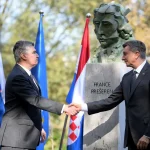ZAGREB, February 28, 2020 – International law is the basis for solving the Croatian-Slovenian border dispute, on which the European Commission and the European Court of Justice have taken positions, Croatian President Zoran Milanović said on Thursday after talks with Slovenian President Borut Pahor.
The two heads of state held a working meeting in Otočec Ob Krki, Slovenia during Milanović’s first foreign visit as Croatia’s new president.
“What is the basis? In our opinion, international law,” he said, adding that he was saying this “before talks have started.”
He said the two countries were “nowhere” in terms of procedure and that it was necessary to see how to proceed. The basis will be “what we agree.”
“It’s necessary to sit at the table and talk, literally and figuratively, and see how to proceed,” Milanović said, adding that border arbitration was not an issue that “disturbs the sleep and gives a hangover” to the two countries.
Pahor said the outstanding issues would not be solved overnight but that they should be approached in the spirit of “mutual respect, good neighbourliness and European values.” He reiterated, however, Slovenia’s position on the need to honour the arbitration award.
“Slovenia considers that the tribunal has delivered a judgment and that it must be honoured,” he said, adding that resolving outstanding issues was of strategic importance for Slovenia, both in terms of security and the economy.
Pahor directly tied Croatia’s prospective entry to the Schengen Area to the final settlement of the border dispute, i.e. the enforcement of the arbitral tribunal’s 2017 award. “It’s in Slovenia’s interest that Schengen expand to Croatia… The element of security is very important for Slovenia. But if an agreement were reached on the arbitral tribunal, that would make it easier for Slovenia to adopt a decision on Croatia’s Schengen accession.”
Milanovic said Slovenia benefitted the most from Croatia’s protection of its own border. “Croatia wishes to enter Schengen and it’s obvious that Slovenia can benefit the most from that.”
“If Croatia currently weren’t present on the border with Bosnia and Herzegovina, it’s a question what situation Slovenia would be in in protecting its own and Schengen’s external border,” he said.
Milanović said he understood that Slovenia could not ignore the arbitration issue in Piran Bay just like that “because it’s been going on too long and it has an emotional element.” He added, however, that there are border disputes in the EU that have lasted since 1815 and “one lives with that.”
“Slovenia is in a position to say yes or no here. The European Commission has assessed that Croatia meets all the technical requirements (for Schengen) and Slovenia now has to see what suits it.”
Milanović said Croatia was criticised in the European Parliament for being rough and too aggressive in protecting its border, adding that there was both truth and exaggeration in that. “But that’s a tough job that we will and would, in case we enter the Schengen regime as soon as possible, have to do even more intensively.”
Asked what he expected of Slovenia’s new government if Janez Janša became prime minister, Milanović said Janša had been prime minister in two terms already. “I’m convinced there will be no negative surprises, but there will be a dialogue.”
Both presidents supported the cooperation of Croatia and Slovenia in the Alpe-Adria and Brdo-Brijuni initiatives, and strongly supported EU enlargement to North Macedonia and Albania.
“We support enlargement to those two countries which have been kept on the side for a long time, and keeping them in uncertainty is counterproductive and dangerous,” said Milanovic.
He is disappointed, he added, that they have been treated as “poor, less worthy brothers” although they have met many requirements.
“Let’s be realistic. Some conditions they will never and can’t fulfil, just as perhaps neither Croatia nor Slovenia ever would. Negotiations should be begun with those states as soon as possible and simultaneously.”
Milanović said both Albania and North Macedonia had come far and that perhaps they were even blackmailed a little to change some things, such as their name. “What now? Send the message that it’s not enough? That’s not the way to build a common Europe and a common house.”
He said Albania’s problems and legacy “can’t be erased overnight” and that it was a burden with which the EU must enter into an arrangement with Albania. It would be even worse to say that the EU does not count on Albania, he added.
“What kind of message is that to a state in which 60% of the population is nominally Islamic, keeping them waiting so long?” Milanović said, adding that he feared that might be interpreted as if that was too many non-Christians.
As for the Slovenian government’s criticisms that the measures Croatia has taken to prevent coronavirus from harming the economy, he said he believed the Croatian government was doing what was necessary.
More news about relations between Croatia and Slovenia can be found in the Politics section.








